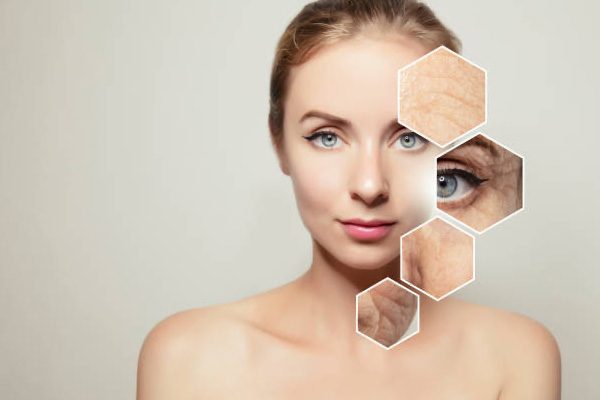The skin plays a vital role in the social and visual experience, as it can tell an individual's age and reflect the consequences of ageing. Everyone possesses a unique genetic blueprint and lifestyle, which profoundly affect the skin's physiological functions. By middle age, these influences may contribute to a staggering 50% decline in skin vitality.
As the skin ages, intricate biological changes unfold, including the depletion of fibrous tissue, decelerated cellular renewal, and diminished vascular and glandular networks. The skin's barrier function, crucial for hydration and protection, falters. Subcutaneous tissue undergoes flattening, particularly in facial, hand, and foot regions.
The Effects of UV Wavelengths and Infrared on Your Skin
A suntan serves as evidence of skin damage, indicating the skin's effort to shield itself from further harm. UVA radiation, constituting most of total UVR (90–95%), penetrates deeply into the epidermis and dermis, triggering oxidative stress that prompts post-UV inflammation and melanin production, resulting in hyperpigmentation. Despite being mistakenly linked with health and vitality, this "tanned" appearance is a consequence of oxidative stress.
Although UVB radiation is a small portion of UVR (about 5%), it is highly detrimental to DNA and epidermal keratinocytes, often leading to sunburn and non-melanoma skin cancer. While UV-B radiation stimulates vitamin D synthesis in the skin, achieving optimal vitamin D levels solely through sun exposure is not advisable due to the detrimental effects of excessive sun exposure.
The Role of Zombie Cells in Skin Ageing
Our skin constantly changes due to internal and external factors, and one of the most significant contributors to ageing is the accumulation of senescent cells, also known as zombie cells. These cells have stopped dividing but remain active, releasing inflammatory proteins that break down collagen and elastin, leading to visible signs of ageing.
How Senescent Cells Affect Skin Health
Zombie cells compromise skin function and appearance in several ways:
- Accelerated Skin Ageing: These cells release inflammatory proteins that degrade collagen and elastin, leading to wrinkles, sagging, and a loss of firmness.
- Reduced Skin Regeneration: Senescent cells hinder healthy cell turnover, resulting in dull, uneven skin tone and poor texture.
- Chronic Inflammation: The inflammatory response triggered by zombie cells exacerbates redness, sensitivity, and oxidative stress, contributing to premature ageing.
- Compromised Skin Barrier: A weakened skin barrier makes the skin more vulnerable to environmental damage, dehydration, and pigmentation.
The Four Pillars of Ageing
Skin Renewal’s holistic skincare strategy is built on four key pillars:
- Innovative Injectables: Advanced treatments like botulinum toxin, dermal fillers, and threads, applied using the MD Codes™ method, target the root causes of ageing, preventing wrinkles and restoring volume.
- Advanced In-Office Treatments: A range of cutting-edge treatments, including laser therapy, chemical peels, and skin needling, are designed to rejuvenate and enhance the skin.
- Personalised Skincare Regimens: Customised advice on home skin care products ensures long-lasting results beyond the clinic.
- Healthy Lifestyle Guidance: Skin Renewal emphasises that true beauty begins from within. We support healthy lifestyle habits that complement aesthetic treatments.
The Connection Between Skin Health and Gut Health
The human skin hosts various microorganisms collectively known as the skin microbiota. This microbiota forms a complex interplay with the epidermis cells, the skin's outermost layer. Beneficial bacteria like Lactobacillus and Bifidobacteria have effectively treated certain infections, enhanced immunity, and reduced skin inflammation.
Oral intake of pre-and probiotics has been shown in vivo to rebalance the skin microbiota and enhance skin barrier function. Furthermore, oral probiotics bolster cellular antioxidant capacity and mitigate inflammation.
In addition to these benefits, probiotics are crucial in neutralizing toxic byproducts, protecting the intestinal lining, enhancing nutrient bioavailability, and strengthening the intestinal barrier against harmful microbes that could negatively impact skin health.
To prevent accelerated skin ageing, one can employ a multifaceted approach. This includes utilising topical interventions enriched with scientifically advanced ingredients like growth factors, peptides, and retinol, which aid in maintaining youthful skin structure and function. Additionally, targeted nutritional supplements can fortify the skin from within, promoting overall health and bolstering its resilience. By nurturing the body internally and externally, one can foster a harmonious balance that supports a healthy body and vibrant, youthful-looking skin.
Aesthetic Treatments Available at Skin Renewal For Ageing Skin
In the dynamic world of cosmetic and medical aesthetics, advancements over the past two decades have led to many sought-after non-surgical treatments catering to the quest for youth and beauty. Skin Renewal clinics offer a range of minimally invasive procedures with minimal downtime and risks. These include laser treatments like Laser Genesis and PICO Laser, Intense Pulsed Light (IPL) therapies such as Limelight, hyaluronic acid-based fillers like Revanesse, Juvederm and Restylane, botulinum toxin injections like Botox and Dysport, chemical peels, radiofrequency procedures like Endymed, microdermabrasion, and mesotherapy.
Factors Contributing to Skin Ageing | Effects |
|---|---|
Intense physical and psychological stress, alcohol intake, poor nutrition, overeating, environmental pollution, UV exposure | Premature skin ageing, uneven pigmentation, wrinkles, sagging skin, structural deterioration |
Genetic factors such as hormonal status and metabolic reactions (oxidative stress) | Cellular ageing, replicative senescence, decreased cellular renewal, reduced vascular and glandular networks |
Hormonal changes (decline in estrogen, testosterone, DHEA, growth hormones) | Thinning of skin, increased wrinkling, decreased moisture, slower cellular renewal |
Oxidative stress (UV radiation, air pollution, glycation) | Collagen breakdown, altered cellular renewal cycles, DNA damage, inflammation, reduced skin immunity |
Elevated blood sugar levels and glycation | Collagen abnormalities, loss of elasticity, increased rigidity, tendency to rashes and infections |
Solar Ultraviolet Radiation (UVR) and Infrared (IR) Radiation | Photoaging, dermal connective tissue damage, decreased immunity, oxidative stress, inflammation, collagen degradation, depletion of antioxidants, failure of antioxidant defence systems |
Tobacco Smoking | Oxidative stress, impaired blood flow and circulation, DNA damage, "smoker's skin" characteristics (fine lines, wrinkles, uneven tone, dehydration), improvement upon cessation |
Pollution | Premature skin ageing, hyperpigmentation, sluggish skin cell renewal, correlation with poor health status, environmental toxin exposure |




